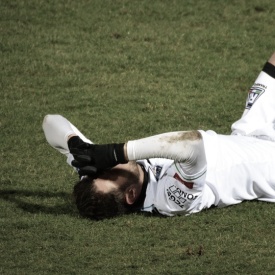Coaches, Parents: Know the Sports Related Concussion Global Recommendations
Parents, coaches – and, of course, athletes – are you aware of the global recommendations for treatment and prevention of concussion? You should, because new information is available all the time.
 We’ve talked quite a bit about sport-related concussion (SRC) over the past few years. That’s because it has only been over the past few years that serious study has really started to gain momentum in this field. And we still have a lot to learn.
We’ve talked quite a bit about sport-related concussion (SRC) over the past few years. That’s because it has only been over the past few years that serious study has really started to gain momentum in this field. And we still have a lot to learn.
In 2001, experts from around the world gathered for the first ever International Conference on Concussion in Sport in Vienna, Austria. It was organized by medical branches of the Olympic Committee, the International Ice Hockey Federation, and the Federation Internationale de Football Association (FIFA).
Since then there have been four more conferences. Each conference has led to a document with official recommendations, the most recent published this past April.
It can be somewhat daunting to read the whole article, though I would recommend it (full article: Consensus statement on concussion in sport—the 5th international conference on concussion in sport). But here are a few highlights that will be of special interest to our community here:
- What is Sport Related Concussion? “…SRC is often defined as representing the immediate and transient symptoms of traumatic brain injury (TBI).” Terms and definitions here are not precise and hopefully will be improved upon someday. But basically, SRC, a traumatic brain injury, is caused by a blow to the body, resulting in trauma to the head. The patient will usually experience temporary neurological symptoms (you may notice that the person is slow to get up, perhaps disoriented, and may have balance issues. Headache is also an early indication).
- Doctors are encouraged to use tools to evaluate the patient, such as the Concussion Recognition Tool v.5 or, for children, the Child Sport Concussion Assessment Tool v.5. (It would be helpful if someone at the sporting event, doctor or not, was familiar with these tools.)
- Players with signs of SRC should be removed from the game immediately, and should be encouraged to rest for at least 24-48 hours (more on this in a moment). They should see a doctor ASAP.
- Rest-Rehabilitation: Just how to treat SRC has been a key area of research in recent years. The recommendation is that the patient rest for 24-48 hours (that’s full rest – no school, no homework, etc). Afterwards they gradually, step by step, go back to regular activities. This will take at least several days, and if any symptoms return, the patient should slow down again. See the document itself for specific recommendations for children, adolescents, and adults.
- The patient should not go back to their sport until symptoms are gone and they are no longer taking any “painkillers”.
- Usually symptoms are resolved and the person has returned to normal activities within a month (often less time). But there are times when symptoms continue, for various reasons, and treatment needs to continue.
- Prevention: Some types of prevention are difficult to measure (for example, you can’t measure the value of helmets vs. no helmets in professional hockey, because everyone must wear a helmet). However, there is good evidence that body checking should be avoided under the age of 13 in hockey – and perhaps in older ages as well.
- Migraine and Depression: It may be unclear whether or not pre-existing migraine slows your recovery, but it does seem that developing migraine symptoms or depression after a SRC are indicators that recovery will take longer than a month – perhaps significantly longer. Doctors and patients, as well as parents/friends should watch for potentially related symptoms, which may lead to different treatments.
More study is underway to see if certain exercises and special training can help avoid SRC – see for example this current clinical trial for Primary Prevention of Concussion in Youth Ice Hockey Players.
This is just a brief summary of some of the highlights in my own words. I would encourage parents and coaches to be familiar at least with the tools recommended above. They also need to be aware that anyone with suspected concussion should see a doctor right away, and will probably be out of the game for a few days or even a few weeks.
The high pressure of sport makes this a significant challenge. But if you’re aware of the years of suffering that patients have endured due to ongoing symptoms such as headache that started with a SRC, as I am, surely you would take the issue very seriously.
Related information:
- Concussion: What Kind of Rest is Needed?
- Drug use in Sports: The Dangers of “Legal Painkillers”
- What causes the symptoms of a concussion?
You also might be interested in the movie Concussion, starring Will Smith, which shows some of the challenges of this issue related to NFL football.
